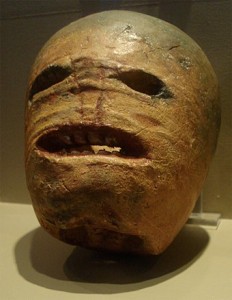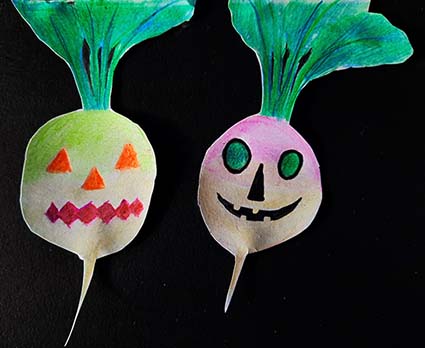Halloween was introduced in both France and Germany in the 1990’s. But Rommelbootzennaat has been celebrated in the French region of Moselle for hundreds of years. Rommelbootzennaat translates to Night of the Grimacing Beets. The word is in a German dialect that’s spoken in Moselle called Lorraine Franconian. You pronounce it Rom-mel-boot-zen-naat. The holiday is also celebrated in a nearby state of Germany called Saarland.
The holiday has its origins in an ancient Celtic festival called Samhain. It’s interesting to note that Halloween was originally imported to the US by Celtic Irish migrants in the 19th century.
Rommelbootzennaat takes place on the eve of All Saints’ Day in France, just like Halloween. In Saarland, Germany it’s celebrated on November 11th, St. Martin’s Day. Children carve beets, just like turnips are carved for Halloween in Ireland.They also put a candle inside their carved beet. The Celtic immigrants who popularized Halloween in the US used native pumpkins to make jack-o-lanterns instead of turnips.

Just like Ireland and the US, in Moselle the carved beets are put in windows. Originally it was to frighten away evil spirits, but nowadays it’s to frighten people passing by!
1st Image: Illustrated by Monique Palomares
2nd Image: A traditional Irish turnip Jack-o’-lantern from the early 20th century. Photographed at the Museum of Country Life, Ireland by Rannpháirtí anaithnid cc 3.0.
This article was posted on Saturday, May 8th, 2021 at 8:31 pm and is filed under Celtic, Countries & Cultures, France, Germany, Halloween, Holidays Around the World, Ireland, Mama Lisa, Rommelbootzennaat (Night of The Grimacing Beets). You can follow any responses to this entry through the RSS 2.0 feed. You can skip to the end and leave a response. Pinging is currently not allowed.


























May 9th, 2021 at 6:39 pm
Hi,
I come from this place ;-)
Rummelbootzennacht are three words:
Rummel is a dialect word for “fodder beet” (we pronounce it with hard german “r”, the u like “foot”). We know a lot of words fore that ;-). The official German Word is “Futterrübe” (beta vulgaris), but in dialect of Saarland, (not Sarre – that’s the French notation ;-)), in parts of palatine, Alsace, Lorraine or Luxembourg, we have:
Rummel, in the rest of Germany there are: Runkelrübe, Runkel, Raahner, Rangasn, Dickwurzel, Kiel, Gunkel, Dorschen … ;-)
Bootze (we pronounce the “oo” like in Santa’s “Donner” or in “Wonder” with long oos like in “wasn’t”) is a dialect word for someone who is disguised (like on carneval). A joker is a “Bootze” and the guy who overstates the dressing-up, the king of clowns, is a “Faasend – Botze” (Faasend is Fastnacht, carnival)
Naar is the dialect word for night.
The Rummelbootzenaat is not on Halloween! We celebrate Halloween since the last years of 1990s. Bringing candles in a fodder beet is tradition and ancient customs on November, the 11th, the Day of St. Martin, the Martinsday. Children are carrying torches or lanterns – or Rummelbootze. We do a torchlight procession behind our Martin (a man with roman helmet and the red cape) who sits on a horse. And than we sing Martin-Chants. ;-)
May 9th, 2021 at 7:12 pm
Thanks for your interesting commentary Michael Fromm! I wonder if different areas celebrate Rummelbootzennacht on different days? Because everyone on the internet who writes about it in French says it’s on the eve of All Saints’ Day.
May 10th, 2021 at 11:18 am
That’s why I love your blog – I learned a lot the last night ;-)
OK – I’ll do my very best, but I think, not everything is easy for me to translate … I’ll try.
I think it’s a classical catholic-protestant-thing: On Alsace and Moselle you have a lot of catholics (like on Saarland, in Luxembourg). In some french regions, you find the “rummelbootzenacht” and maybe that’s one reason for pumpkins on Halloween (that’s, what I learned tonight). There are a few things that have mixed up
You have a lot of things, that catholics did on St.Martin’s Day: In the past, catholics practices a period for fasting before Christmas, so the Martins-Day was the last before starting fasting. Martin’s Day was the day where the farmers paid rent (in some regions of palatine they still do it today), the harvest was in and the servants and maids got their salary. This is on November, 11th.
Than we have “Erntedankfest” (harvest-thanks-party) – maybe the origin of Thanksgiving. We do it on the first Sunday of October, or the first Sunday after Michael’s Day (September, the 29th). Catholics and Protestants have their own day …
We didn’t anything on the night before All Saints’ day. All Saints’ Day is in Germany a “silent day” like November the 2th, we call it “All Souls’ Day”. For these days (and some others – like Good Friday – there are special laws – they change between the countries. We have a “dance-ban” and do these days silently, a little bit sad. On November 2nd we go to the cemetery to remember those who died.
Only on Martin’s Day do we meet together, we do a candle procession with candles, lanterns and torches, with brass music and then we sing.
Maybe in French they did it on Halloween night – in Germany we did in on St. Martin’s Day.
Halloween you find in Germany since the 90’s. In 1991, the Carnival in Germany was canceled due to the Gulf War. In the mid-1990’s, business people from the costume industry introduced Halloween in Germany with a campaign. So the costume makers tried to sell the unsold costumes from 1991 … now our children celebrate Halloween too and they love it ;-)
You don’t find the “Rummelbootze” that often in Germany anymore. Corn is grown as feed for animals – so fodder beets have become rarer …